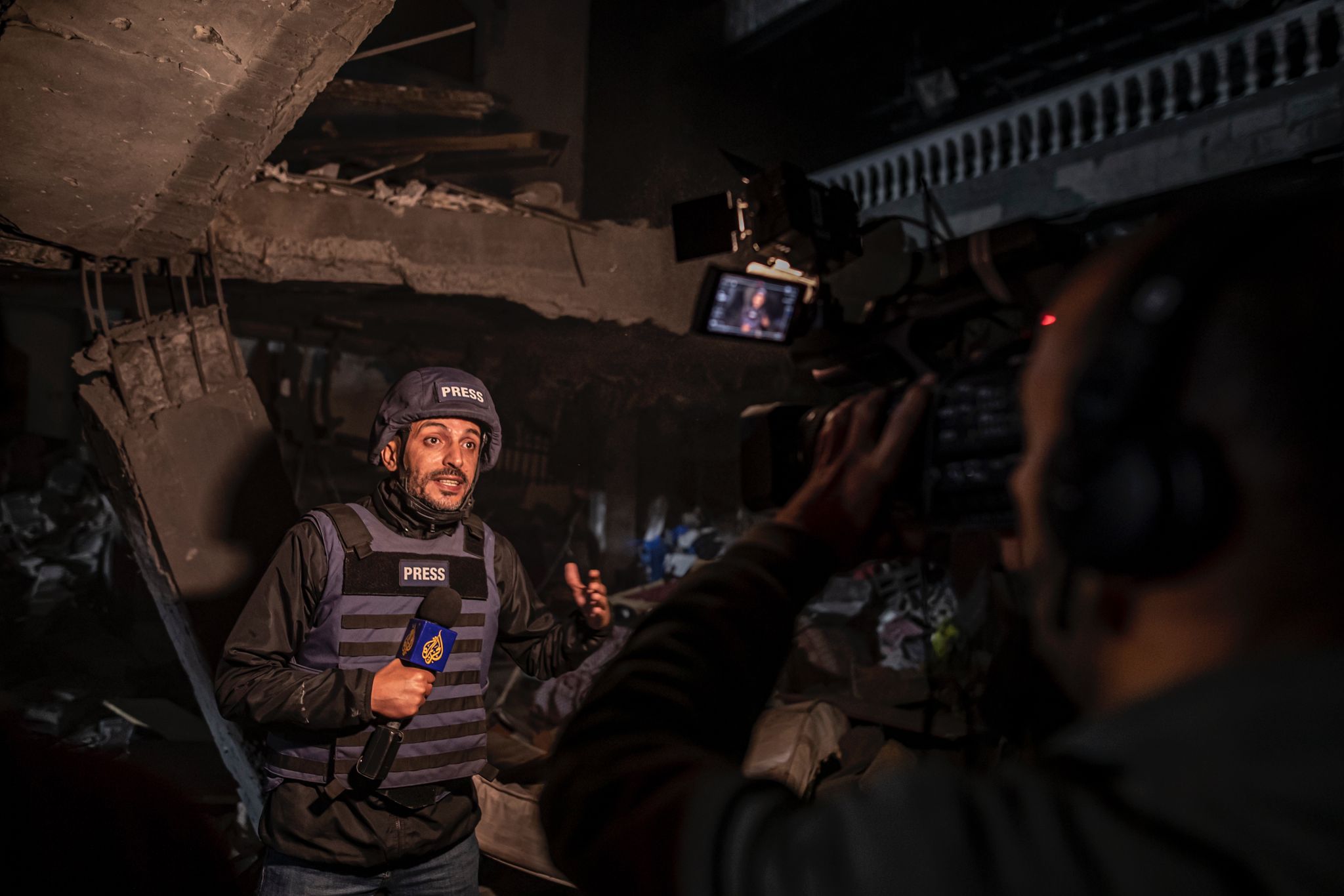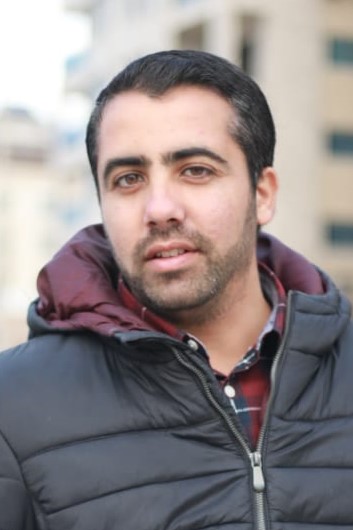تجارب من الميدان
مؤمن الشرافي، مراسل قناة الجزيرة، كانت له تجربة مؤلمة مع النزوح الذي حرمه من إلقاء نظرة الوداع على 22 فردا من أسرته قضوا خلال هذه الحرب في مدينة غزة، بينما كان هو في جنوب القطاع مترقبا كل خبر عنهم، ولا يدري أنهم بُعيد لحظات سيتصدرون شريط الجزيرة العاجل هذه المرة، وينقل للعالم أجمع بصوته وصورته خبر استشهادهم.
يروي مؤمن لـ"مجلة الصحافة" كيف عانى من النزوح مرات كثيرة: "تنقلت لأكثر من مكان في غضون أشهر قليلة، ما بين مدينة خان يونس ورفح ودير البلح والنصيرات، عملت في المستشفيات ومراكز الإيواء ومخيمات النزوح، وعلى الطرقات وبين الركام وعلى أنقاض ما تبقى من منازل وبين الخيام.. تلك الخيام التي أضحت مكانا لمعيشتنا ومكتبا لعملنا الصحفي"، مستدركًا: "نحن من هذا الشعب، نعيش تفاصيل حياتنا مع الناس، نتقاسم همومهم وآلامهم، وسنبقى كذلك". ويصف الشرافي رحلة نزوحه قائلا: "هي رحلة الموت بما تعنيه الكلمة من معنى، رحلة صعبة وقاسية، محفوفة بالمخاطر يكون فيها الانتقال للمجهول؛ إذ يفتقر أي مكان يُمكن النزوح إليه إلى الأمان وإلى أدنى مقومات الحياة الأساسية".
يضيف الشرافي: "تحت وطأة القصف وشدته كنا نخرج مع عائلاتنا من دون أن نحمل معنا سوى القليل من أمتعتنا الشخصية، مما يضطرنا إلى خلق حياة أخرى من العدم في المكان الجديد الذي لا نعلم متى سنغادره هو الآخر". كما يُجمل متطلبات النزوح بدءا من توفير خيمة تؤوي العائلة وبالكاد تقيهم البرد في الشتاء وأشعة الشمس الحارقة في الصيف، فتغدو الخيمة بلا مبالغة كأفران ملتهبة من الداخل".
لا يتوقف الأمر عند هذا الحد، "أضف إلى ذلك توفير مصادر المياه العذبة ومياه الاستخدامات الأخرى، والطعام، والطاقة الشمسية، والحطب، ودورات المياه البدائية بأقل الإمكانات".
"هي رحلة الموت بما تعنيه الكلمة من معنى، رحلة صعبة وقاسية، محفوفة بالمخاطر يكون فيها الانتقال للمجهول؛ إذ يفتقر أي مكان يُمكن النزوح إليه إلى الأمان وإلى أدنى مقومات الحياة الأساسية".
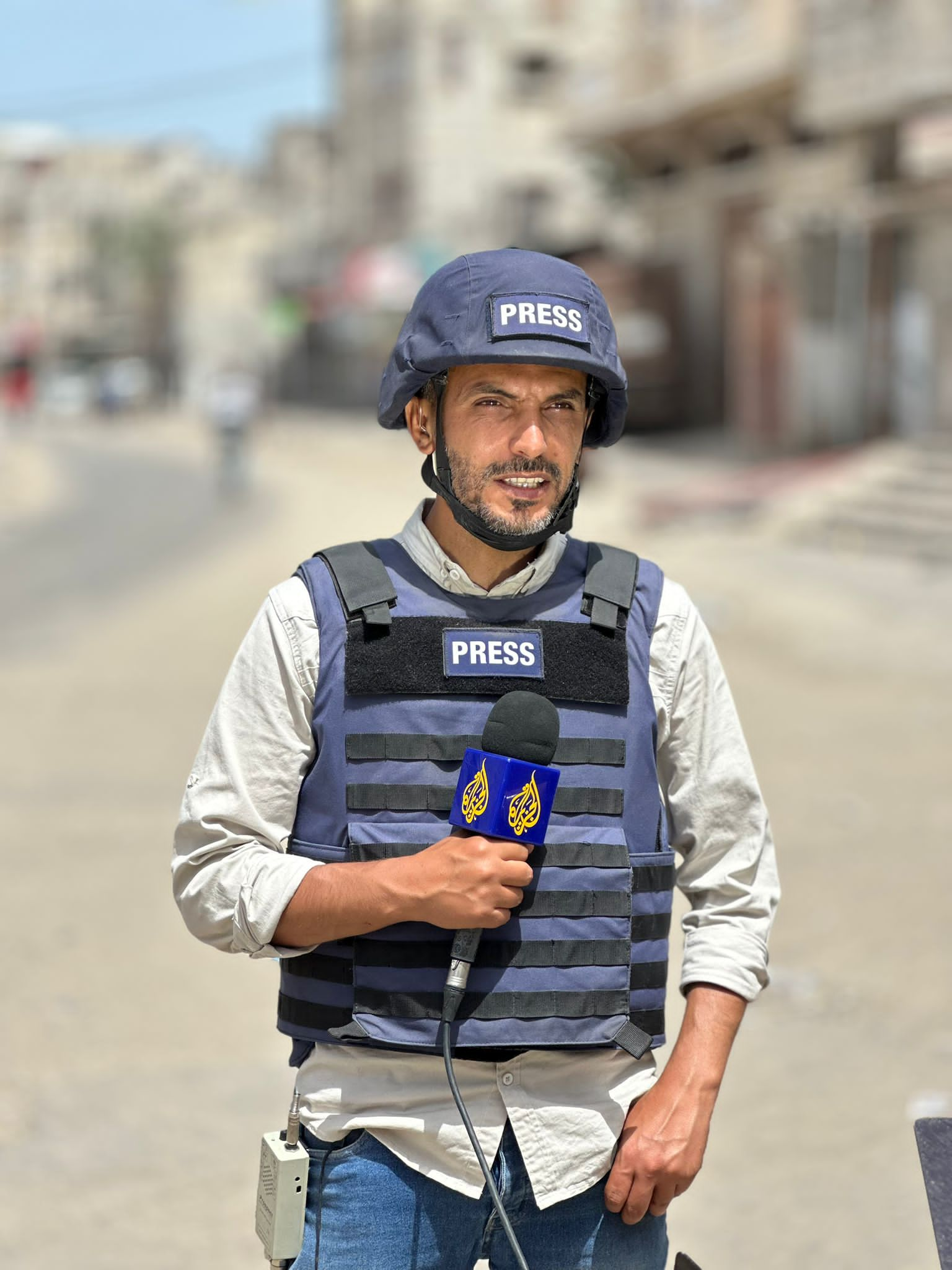
صدمات نفسية بالجملة
يُشاهد ملايين المتابعين في العالم الشرافي على شاشة الجزيرة مُرتديا درعه الصحفي وخوذته الواقية، ينقل للعالم مشاهد الدماء والأشلاء، ثم ما يلبث أن يُنهي مداخلته عبر الهواء حتى يقف حائرا مُكبل المشاعر من هول ما يراه من مجازر تصيبه بصدمات نفسية مُتلاحقة. ولا يُنكر أن حياة النزوح رافقت عمله الصحفي؛ إذ ليس سِرًّا أنه يتشارك مع زملائه تنظيف المكان وغسيل الأواني والملابس وتجهيز الطعام، "هذا جزء من التحدي الذي يجب أن نتغلب عليه".
وتنسحب هذه الحالة على الصحفي الاستقصائي محمد أبو شحمة الذي اضطر إلى الخروج من منزله مع أسرته على وقع إطلاق نارٍ كثيف من مُسيَّرة إسرائيلية، أعقبه قصف مدفعي عنيف لمنطقة سكناه غرب مدينة خان يونس.
استغرق أبو شحمة يومين لتجهيز خيمة لأسرته ضمن مخيم في مدينة رفح ليُباشر عمله الصحفي من المستشفى الكويتي بالمدينة. استفاد من مكانهِ بين خيام النازحين ليبقى على مقربة من معاناتهم، يسمع قصصهم وحكاياتهم، وينقل همومهم ووجعهم؛ "فنحن جزء من هذه القصة نرويها بلسان الصحفي النازح".
تفاجأ أبو شحمة بتدمير منزله واستشتهاد أخيه وأخته ومرض ابنته التي لم يجد لها علاجا طال البحث عنه بين رفوف الصيدليات ومخازن المستشفيات بلا جدوى. ووسط كل هذه المعاناة، ينزح مُجددًا إلى خان يونس حيث ما تبقى من أحيائها ومرافقها.
يصف أبو شحمة المدينة قائلا: "هي أشبه بمدينة الأشباح، لا مبانٍ ولا طرقات ولا بنى تحتية، ولا شبكات للمياه والكهرباء والاتصالات والصرف الصحي، وحين عدت لم أعرف وجهة منزلي، لقد تغيرت معالم المدينة ومحيت كاملة".
كانت أعباء النزوح بالنسبة لأبو شحمة مُكلفة ماديا، برفقة زوجته وأطفاله الخمسة ووالدته؛ يستعرض جزءا من معاناته في التنقل "فحتى إن توفرت وسيلة المواصلات، فلا وقود لتشغيلها، وإن توفر بعضه فهو باهظ الثمن، لتصل رحلات النزوح في معظمها إلى ما يقرب من 1000 شيكل (260 دولارا) وأحيانا تصل إلى أكثر من ذلك، ومع تكرار الرحلة تتكرر المأساة".
حتى إن توفرت وسيلة المواصلات، فلا وقود لتشغيلها، وإن توفر بعضه فهو باهظ الثمن، لتصل رحلات النزوح في معظمها إلى ما يقرب من 1000 شيكل (260 دولارا) وأحيانا تصل إلى أكثر من ذلك، ومع تكرار الرحلة تتكرر المأساة".
أما الصحفية مريم أبو دقة، المصورة في موقع إندبندت عربي، فلم تكن تجربتها بمنأى عن أحوال سكان المناطق الحدودية مع الاحتلال، حيث توجد قرب التماس مع خطوط النار، وهو ما يُبقيها على الدوام جاهزةً لإخلاء منزلها والاكتفاء بأخذ معداتها الصحفية معها؛ إذ ليس ثمةَ فسحة من الوقت لنقل ما تريد. خلال حديثها، لم تستطع أبو دقة وصف شعور العجز الذي ينتابها حين ترى مشاهد الأطفال الناجين من القصف، تقول: "ما شعورك وأنت ترى طفلا فقد كل عائلته ولم يتبقَ له سوى ذكريات أليمة؟".
في الخامس من ديسمبر/ كانون الأول 2023، شتت النزوح الصحفية أبو دقة عن أسرتها مجددا، بعد بداية الاجتياح الإسرائيلي البري لمدينة خان يونس. ترجع أبو دقة بتفاصيل ذاك اليوم: "كنت حينئذ على رأس عملي، ولم أستطع التواصل مع أسرتي؛ إذ لم تكن شبكات الاتصال تعمل، ولم أعرف ماذا حل بهم وأين توجهوا، وحين عاد الاتصال، أمسكتُ مسرعة بالهاتف للاطمئنان عليهم، وحينئذ عادت لي الحياة من جديد".
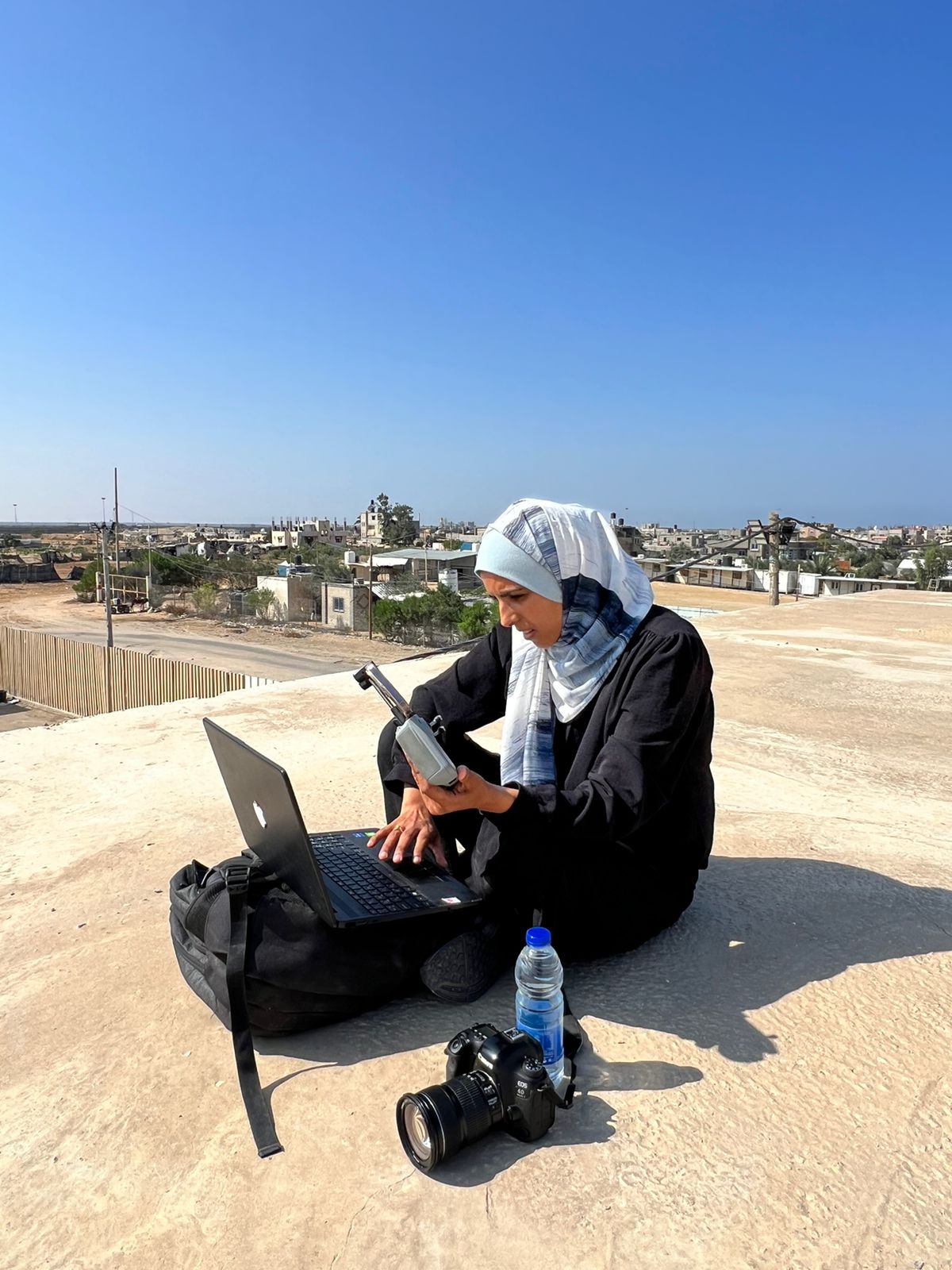
للنزوح بقية
لا تختلف تجربة شروق شاهين، مراسلة قناة سوريا، عن زملائها الآخرين؛ إذ أُجبرت على النزوح من مدينة غزة إلى وسط القطاع وحيدةً لتلحق بها أسرتها بعد أسبوع، وتؤكد أن تأقلم الصحفي مع أماكن النزوح ليس سهلا، يصطدم فيه المرء دائما بسؤال: أين ستكون الوجهة؟ وكيف سأتدبر أمور عملي وأسرتي؟
كانت شاهين تأمل أن تكون مدينة رفح هي وجهتها الأخيرة في النزوح بعد سلسلة من الانتقالات لأكثر من مدينة في أكثر من مكان، وأن تكون نهاية المطاف في مكان سكنها بمدينة غزة، لكن خبر بدء العدوان البري الإسرائيلي على رفح وقع كالسهم على قلبها؛ هذا يعني أنه لا تزال للنزوح بقية.
لم يدر في مُخيلة الصحفية شاهين أن تُؤسس لعائلة جديدة في قسم الحضانة بمستشفى شهداء الأقصى الذي اضطرت إلى المبيت فيه عدة أشهر؛ إذ استطاعت أن تنسج علاقة الابنة بالأمهات اللواتي كُنَّ يَبِتْن مع أطفالهن الخُدج.
تقول شاهين: "لاحظت الأمهات كمية الإرهاق التي كنت أحملها في نهاية يوم العمل، فكانوا يُعِدون لي الطعام، ويُحضرون لي الماء الساخن".
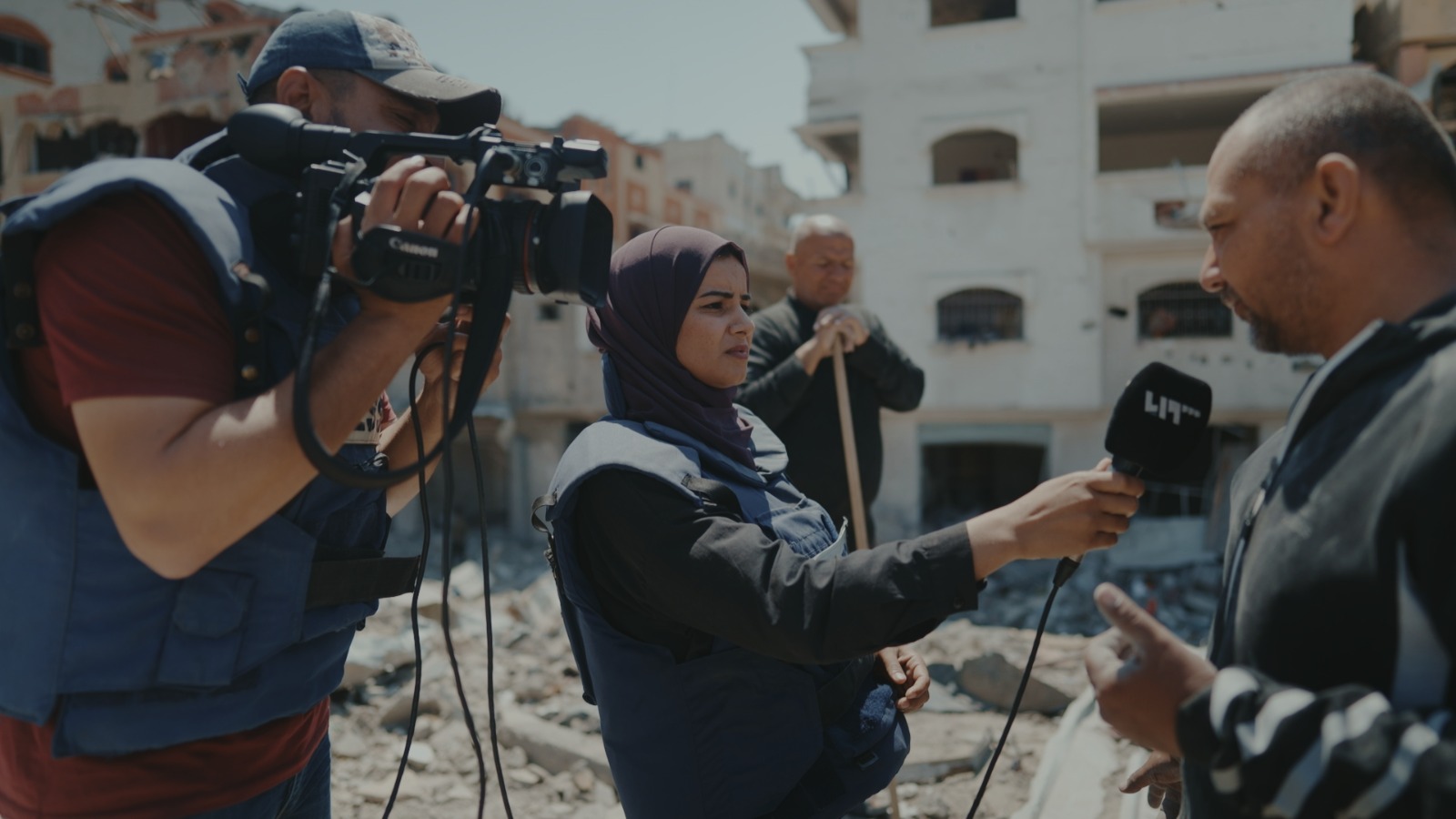
كبقية سكان قطاع غزة، عانت الصحفية شاهين من حرب التجويع خلال نزوحها، فكانت تقضي بعض أيامها على حبات من التمر، وتصف فرحتها حينما تذوقت طعم الخبز الغزاوي بعد توقف المخابز بسبب نفاد الوقود لتشغيلها.
كبقية سكان قطاع غزة، عانت الصحفية شاهين من حرب التجويع خلال نزوحها، فكانت تقضي بعض أيامها على حبات من التمر، وتصف فرحتها حينما تذوقت طعم الخبز الغزاوي بعد توقف المخابز بسبب نفاد الوقود لتشغيلها، وعانت أيضا من توفير الدواء لوالدتها، الذي انقطع لفترات طويلة ما اضطرها إلى تقليص تناول الكمية المتبقية منه، كما أنها عانت من تصوير الأشعة بسبب تعطل الأجهزة، ولا حل سوى الانتظار.
تقف شاهين في ساحات مستشفى شهداء الأقصى وسط القطاع، ومن حولها عربات الإسعاف كعقارب الساعة تنقل مزيدا من الجرحى والشهداء دون توقف، تتساءل شاهين قائلة: أما آن لكل هذا أن يتوقف!
